| Listing 1 - 7 of 7 |
Sort by
|
Book
ISBN: 2729897984 9782729897987 Year: 1997 Volume: *2 Publisher: Paris: Ellipses,
Abstract | Keywords | Export | Availability | Bookmark
 Loading...
Loading...Choose an application
- Reference Manager
- EndNote
- RefWorks (Direct export to RefWorks)
La liberté est intelligible comme, d'ailleurs, la vérité. Ces deux notions sont sœurs contrairement aux apparences. Seul un être libre peut se proposer de dire vrai et de viser la vérité. Ni la liberté, ni la vérité ne sont des faits, mais il n'y a de faits que pour la liberté en vue de la vérité. Sans liberté rien ne saurait différencier l'homme d'une chose. Mais s'il n'y avait que la liberté (comme l'inconséquente pensée en imagine le fantasme) il n'y aurait pas du tout de liberté parce qu'il n'y aurait rien à faire et à penser. Le problème de la liberté n'est donc pas un problème philosophique comme les autres parce que la liberté constitue le fond de toute pensée.
Compatibilism --- Determinism and free will --- Determinism and indeterminism --- Determinisme en indeterminisme --- Déterminisme et indéterminisme --- Free agency --- Free will and determinism --- Freedom and determinism --- Freedom of the will --- Indeterminism --- Indeterminisme --- Liberty of the will --- Libre arbitre et déterminisme --- Vrije wil --- Vrije wil en determinisme --- Vrijheid van de wil --- Wilsvrijheid
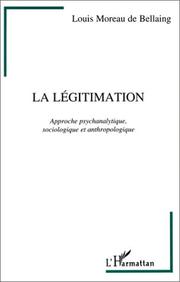
ISBN: 2738449441 9782738449443 Year: 1997 Volume: *6 Publisher: Paris: L'Harmattan,
Abstract | Keywords | Export | Availability | Bookmark
 Loading...
Loading...Choose an application
- Reference Manager
- EndNote
- RefWorks (Direct export to RefWorks)
Compatibilism --- Conscience (Morale) [Examen de ] --- Conscience [Examination of] --- Consensus (Sciences sociales) --- Consensus (Social sciences) --- Consensus (Sociale wetenschappen) --- Determinism and free will --- Determinism and indeterminism --- Determinisme en indeterminisme --- Déterminisme et indéterminisme --- Examen de conscience --- Free agency --- Free will and determinism --- Freedom and determinism --- Freedom of the will --- Gewetensonderzoek --- Indeterminism --- Indeterminisme --- Liberty of the will --- Libre arbitre et déterminisme --- Self-examination --- Vrije wil --- Vrije wil en determinisme --- Vrijheid van de wil --- Wilsvrijheid
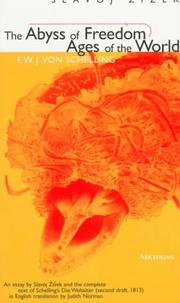
ISBN: 0472066528 Year: 1997 Publisher: Ann Arbor University of Michigan press
Abstract | Keywords | Export | Availability | Bookmark
 Loading...
Loading...Choose an application
- Reference Manager
- EndNote
- RefWorks (Direct export to RefWorks)
Ontology --- Absolute, The --- Free will and determinism --- History --- -Idealism, German --- Psychoanalysis --- German idealism --- Compatibilism --- Determinism and free will --- Determinism and indeterminism --- Free agency --- Freedom and determinism --- Freedom of the will --- Indeterminism --- Liberty of the will --- Being --- Annals --- Philosophy --- Absolute, The. --- Idealism, German --- Psychology --- Psychology, Pathological --- Metaphysics --- Necessity (Philosophy) --- Substance (Philosophy) --- History, Modern --- Determinism (Philosophy) --- One (The One in philosophy) --- Lacan, Jacques, --- Schelling, Friedrich Wilhelm Joseph von, --- Lacan, Jacques --- Free will and determinism. --- Idealism, German. --- Ontology. --- Philosophy.
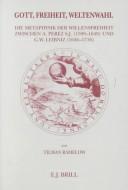
ISSN: 09208607 ISBN: 9004106413 9004247262 9789004106413 Year: 1997 Volume: 72 Publisher: Leiden: Brill,
Abstract | Keywords | Export | Availability | Bookmark
 Loading...
Loading...Choose an application
- Reference Manager
- EndNote
- RefWorks (Direct export to RefWorks)
This study investigates the origins of the concept of 'the best of all possible worlds'. It exemplifies the character of modern metaphysics, which thinks mainly in terms of freedom and possibility. The book contains three parts. The first part tries to reconstruct this concept both historically and systematically; it deals with the concept of possibility beginning with High Scholasticism. The second part investigates the origins of this idea in the Jesuit theory of 'scientia media', which is concerned with human freedom and divine foreknowledge. The third part deals with the question, whether there is any necessity to choose the best - a main theme in late scholastic thought of the 17th century. This investigation of a concept unknown before the time of Leibniz, reveals many new sources and fills a gap in the history of ideas.
Free will and determinism --- Possibility --- Metaphysics --- Theology --- Libre arbitre et déterminisme --- Possibilité --- Métaphysique --- Théologie --- History --- Histoire --- Perez, Antonio, --- Leibniz, Gottfried Wilhelm, --- Libre arbitre et déterminisme --- Possibilité --- Métaphysique --- Théologie --- Logic --- Philosophy --- Compatibilism --- Determinism and free will --- Determinism and indeterminism --- Free agency --- Freedom and determinism --- Freedom of the will --- Indeterminism --- Liberty of the will --- Determinism (Philosophy) --- Pérez Valiende de Navas, Antonio, --- Valiende de Navas, Antonio Pérez, --- Navas, Antonio Pérez Valiende de, --- Leibnitz, Gottfried Wilhelm --- Leibniz, Gottfried Wilhelm --- Free will and determinism. --- Possibility. --- Pérez, Antonio, --- Perez, Antonio, - 1599-1649 --- Leibniz, Gottfried Wilhelm, - Freiherr von, - 1646-1716
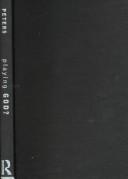
ISBN: 0415915228 041591521X Year: 1997 Publisher: New York Routledge
Abstract | Keywords | Export | Availability | Bookmark
 Loading...
Loading...Choose an application
- Reference Manager
- EndNote
- RefWorks (Direct export to RefWorks)
In this book, Ted Peters explores the fallacies of the "gene myth" and presents a resounding array of arguments against this kind of all-encompassing genetic determinism. On the scientific side, he correctly points out that genetic influences on behavior are in most instances relatively modest. Does anyone deny that identical twins are still able to practice individual free will? After dispatching some of the sweepingly deterministic conclusions of the "science" of evolutionary psychology with a particularly effective set of rebuttals, Peters arrives at the conclusion that the nature of humanness is an interaction of three things- not one, not two, but three: genetics, environment, and free will. Neglecting any one of these three leads down a path of fuzzy thinking and dangerous consequences.
Christian ethics. --- Free will and determinism. --- Human genetics --- Medical ethics. --- Moral and ethical aspects. --- Religious aspects --- Christianity. --- Christian ethics --- Free will and determinism --- Medical ethics --- Biomedical ethics --- Clinical ethics --- Ethics, Medical --- Health care ethics --- Medical care --- Medicine --- Bioethics --- Professional ethics --- Nursing ethics --- Social medicine --- Genetics --- Heredity, Human --- Human biology --- Physical anthropology --- Compatibilism --- Determinism and free will --- Determinism and indeterminism --- Free agency --- Freedom and determinism --- Freedom of the will --- Indeterminism --- Liberty of the will --- Determinism (Philosophy) --- Ethical theology --- Moral theology --- Theology, Ethical --- Theology, Moral --- Christian life --- Christian philosophy --- Religious ethics --- Moral and ethical aspects --- Religious aspects&delete& --- Christianity --- Moral and religious aspects

ISBN: 2711613135 9782711613137 Year: 1997 Volume: 21 Publisher: Paris: Vrin,
Abstract | Keywords | Export | Availability | Bookmark
 Loading...
Loading...Choose an application
- Reference Manager
- EndNote
- RefWorks (Direct export to RefWorks)
Compatibilism --- Determinism and free will --- Determinism and indeterminism --- Determinisme en indeterminisme --- Déterminisme et indéterminisme --- Free agency --- Free will and determinism --- Freedom and determinism --- Freedom of the will --- Indeterminism --- Indeterminisme --- Liberty of the will --- Libre arbitre et déterminisme --- Vrije wil --- Vrije wil en determinisme --- Vrijheid van de wil --- Wilsvrijheid --- Liberty --- Philosophy, Ancient --- Liberté --- Philosophie ancienne --- History --- Histoire --- Plato --- Liberty. --- Free will and determinism. --- Civil liberty --- Emancipation --- Freedom --- Liberation --- Personal liberty --- Democracy --- Natural law --- Political science --- Equality --- Libertarianism --- Social control --- Determinism (Philosophy) --- Plato. --- Liberté --- Libre arbitre et déterminisme --- Aflāṭūn --- Aplaton --- Bolatu --- Platon, --- Platonas --- Platone --- Po-la-tʻu --- Pʻŭllatʻo --- Pʻŭllatʻon --- Pʻuratʻon --- Πλάτων --- אפלטון --- פלאטא --- פלאטאן --- פלאטו --- أفلاطون --- 柏拉圖 --- 플라톤 --- Platon --- Platoon --- Views on free will --- Платон --- プラトン
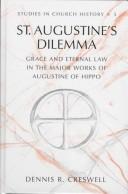
ISBN: 0820428434 Year: 1997 Publisher: New York (N.Y.): Lang
Abstract | Keywords | Export | Availability | Bookmark
 Loading...
Loading...Choose an application
- Reference Manager
- EndNote
- RefWorks (Direct export to RefWorks)
#GOSA:II.P.AU.3 --- #GOSA:II.P.AU.2.M --- Free will and determinism --- Grace (Theology) --- Predestination --- Religious aspects --- Christianity --- History of doctrines --- Augustine, --- Foreordination --- Salvation --- Law and gospel --- Compatibilism --- Determinism and free will --- Determinism and indeterminism --- Free agency --- Freedom and determinism --- Freedom of the will --- Indeterminism --- Liberty of the will --- Determinism (Philosophy) --- Avgustin, Blazhennyĭ, --- Augustinus, Aurelius, --- Augustyn, --- Augustin, --- Ughasṭīnūs, --- Agostino, --- Agustí, --- Augoustinos, --- Aurelius Augustinus, --- Augustinus, --- Agustín, --- Aurelio Agostino, --- Episkopos Ippōnos Augoustinos, --- Augoustinos Ipponos, --- Agostinho, --- Aurelli Augustini, --- Augustini, Aurelli, --- Aurelii Augustini, --- Augustini, Aurelii, --- Ōgostinos, --- Agostino, Aurelio, --- אוגוסטינוס הקדוש --- أغسطينوس، --- 奥古斯丁 --- Avgustin, --- Augustinus, Aurelius --- Agostinho --- Augustine of Hippo --- Augustine d'Hippone --- Agostino d'Ippona --- Augustin d'Hippone --- Augustinus Hipponensis, sanctus --- Sant'Agostino --- Augustinus van Hippo --- Aurelius Augustinus --- Aurelio Agostino --- 聖アウグスティヌス --- アウグスティヌス --- Augustine
| Listing 1 - 7 of 7 |
Sort by
|

 Search
Search Feedback
Feedback About UniCat
About UniCat  Help
Help News
News